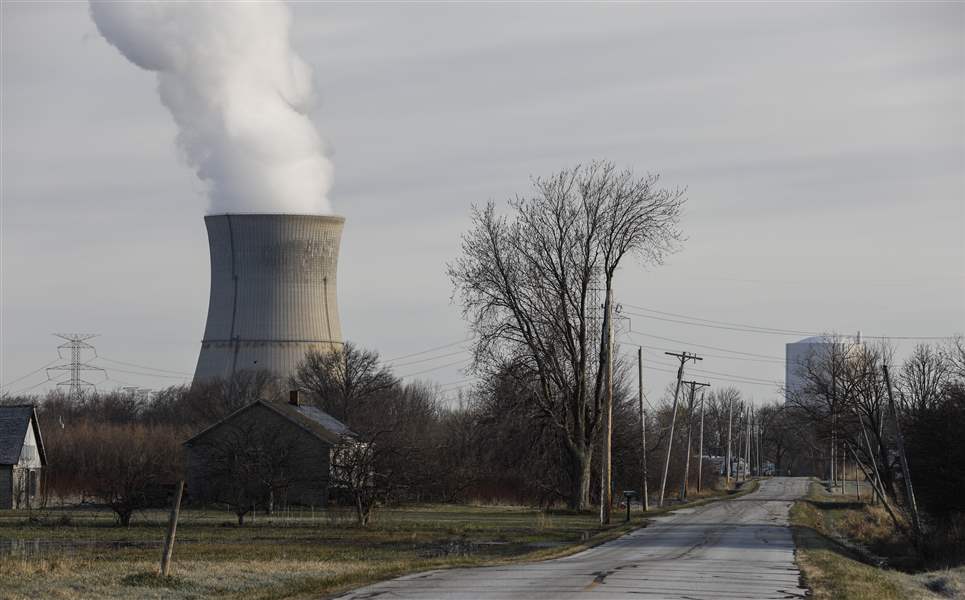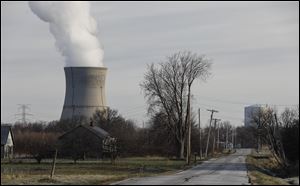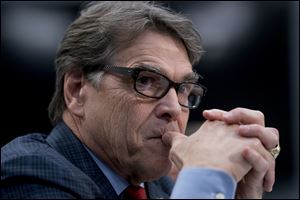
President Trump's nuclear, coal bailout plan draws comparisons to socialism from critics
6/8/2018
FirstEnergy Corp.'s Davis-Besse Nuclear Power Station in Oak Harbor.
The Blade
Buy This Image
The Trump Administration’s plan to bail out the beleaguered nuclear and coal industries continues to draw sharp reaction from critics, with activists now claiming it will cost Americans as much as $34 billion more a year for electricity.
Meanwhile, Howard Learner, executive director of the Chicago-based Environmental Law & Policy Center, claims the directive that was announced June 1 is largely a result of lobbying on behalf of FirstEnergy Corp. by President Trump’s former campaign manager, Corey Lewandowski, and Robert E. Murray, Murray Energy Corp.’s chairman, president, and chief executive officer.
Murray Energy is a major mining company that supplies coal to many affected power plants.

FirstEnergy Corp.'s Davis-Besse Nuclear Power Station in Oak Harbor.
“Clearly, FirstEnergy and Bob Murray of Murray Energy have been aggressively lobbying the Trump Administration for a bailout,” according to Mr. Learner, who said the directive would interfere with the marketplace to ensure cash flow for executives from noncompetitive corporations.
“President Trump is asking the public to subsidize the losers,” Mr. Learner said.
Former U.S. Nuclear Regulatory Commission board member Peter Bradford likewise called it “Trump socialism” during an interview with The Blade.
“This is about favors and political paybacks,” said Mr. Bradford, a board member of the Union of Concerned Scientists who has taught at Vermont Law School, been a state utility regulator for the states of Maine and New York, and delivered expert testimony to Congress in the past.
He was one of the NRC’s five commissioners when Three Mile Island Unit 2 near Harrisburg, Pa., experienced its historic half-core meltdown in 1979, a turning point for America’s nuclear industry.
“It’s not Bernie Sanders socialism. It’s Trump socialism, because the benefits aren’t going to the public at large,” Mr. Bradford said.
The Trump Administration, though, asserts the American public will benefit greatly from the directive.

Energy Secretary Rick Perry
It said the President gave U.S. Energy Secretary Rick Perry orders to step in and develop a rule that will require regional grid operators — including PJM Interconnection, LLC of Pennsylvania, which serves Ohio — to keep buying electricity from failing nuclear and coal-fired power plants at above-market rates as a matter of national security.
The administration’s position is that America cannot become overly reliant on natural gas, renewable energy, and other sources of electricity that are now being sold at much cheaper prices. Natural gas in particular has made great inroads in the market because of how prices have fallen dramatically over the past decade once the modern era of fracking shale began.
Mr. Perry’s rule is to be based on two federal laws that critics contend were intended only for dire emergencies, such as wartime and natural disasters. While the intent to issue the document has been announced, the document itself is still under development.
Mr. Learner and others predict an odd collection of bedfellows — from the American Petroleum Institute to a bevy of anti-nuclear and environmental groups — will challenge whatever is ultimately issued.
The API has said it wants Americans to enjoy the benefits of low oil and gas prices.
According to Mr. Bradford, FirstEnergy’s motivation for a national bailout comes from the fact a disproportionate share of the impact will fall upon its nuclear and coal-fired power plants if one doesn’t come through.
FirstEnergy itself is not facing bankruptcy. Subsidiary FirstEnergy Solutions owns all of the utility’s noncompetitive assets — namely, its nuclear and coal plants — and filed for bankruptcy in March along with another subsidiary, FirstEnergy Nuclear Operating Co. The parent company is hoping to remake itself as a company focused almost exclusively on electrical transmission, not generation.
The estimated impact on American ratepayers was made by the Maryland-based Nuclear Information & Resource Service, which the group said is an update and expansion of a November, 2016, report.
It now estimates the combined impact for subsidizing unprofitable nuclear plants alone at $8 billion a year on the low end, and $17 billion a year on the high end. The group, primarily focused on the nuclear industry, said it believes the impact on ratepayers for coal subsidies would be similar.
Tim Judson, NIRS executive director, said the Trump administration “is rushing headlong into an energy buzz saw, and they don’t even seem to know it.”
At a news event earlier this week, Tyson Slocum, Public Citizen’s energy program director, also claimed a bailout would cost ratepayers billions of dollars and “bolster the profits of a handful of Trump’s top campaign and financial supporters.”
Efforts for a response from the Energy Department late Friday were unsuccessful.
PJM spokesman Susan Buehler said the regional grid operator - one of America’s largest - continues to believe there is “no national security issue and that any intervention like this will damage markets and be costly to consumers.” She added that it continues to be in a “wait-and-see mode” like everyone else.
Contact Tom Henry at thenry@theblade.com, 419-724-6079, or via Twitter @ecowriterohio.